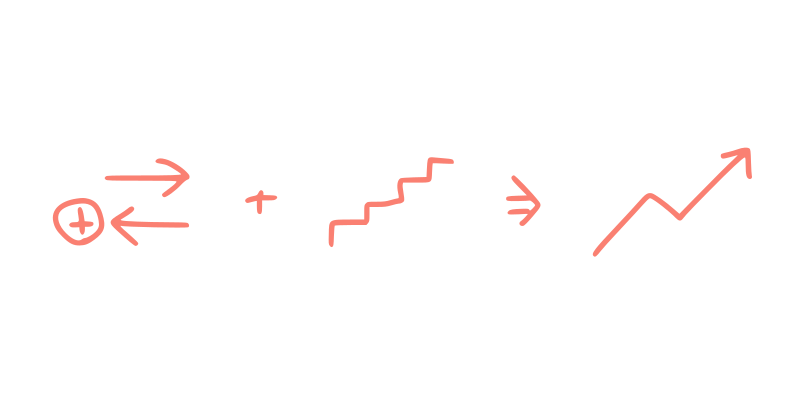How to change or create any habit

I wanted to start running again and eat more healthy food, so I started to look into habits and how to change them.
After watching some interviews with people like Ramit Sethi, or Leo Baubata, I’ve narrowed changing habits down to a few principles that are essential.
Principle #1 — Positive feedback
Does it feel good?
Positive feedback is hugely important, but… what does it mean?
Imagine you’re playing a game. A new challenge comes up and you try and try and try… Finally you overcome it. What do you expect? A reward proportional to the challenge.
Changing habits is like a challenge in a game that’s called life. There’s one catch though — no one is constantly watching you, offering a $1000 if you run the next 10k faster.
In other words, games are motivating, because we are rewarded for trying. There are points, achievements, rankings, badges,… any number of things that give our brain a simple and powerful message: “You are doing something AWESOME, keep doing it, and you’ll get more rewards.”
Now, imagine a different game. You have a challenge. You try and try and try… And you overcome it. What happens next?
Nothing.
There is no immediate reward.
Is that fun? Nope.
That’s what happens in real life. Someone tries to quit smoking, but there is no one person supervising the wannabe non-smoker. There is no reward, no congratulations, nothing. There is no positive feedback. And so the person relapses, because why even try?
What should you do then?
What can we do to help ourselves to quit smoking, run more, eat healthy, or quit procrastinating?
We need to add positive feedback to our actions.
Here’s an example: When I was in Mexico, I started to journal. Soon, I had too many disorganized entries. I decided to organize them. It wasn’t fun. As I was going through the motions in a cafe, I felt an urge to sample the cakes they had there. They looked delicious. So, I combined the wish to have my journaling organized and the wish to have that great carrot cake. How did I do it? After each piece of writing was labeled and summarized, I took the fork and had one bite of the sweet symphony of flavors. I succeeded at organizing my writing.
In the example, I added positive feedback to my actions, which helped me focus and get things done.
The feedback doesn’t need to be a cake, but it should be something pleasurable. Likes on a social network, pat on the back from a helpful friend, 5 min of a favorite mini-game…
Without clear positive feedback, the brain looks at the effort required to not do the bad thing, and says: “huh, why even try. It’s not worth it.”
Principle #2 — Start small to win
It’s awesome to have high goals, but when we want to start something, we need a tiny goal. Instead of going from “I don’t run” to “I will run a marathon”, we need to set a goal like “Get out of the door 5 times a week and run”.
The essential part is the “get out of the door”. It’ a tiny goal, but succeeding at that tiny goal builds up our confidence in our ability to do something. And then we can move on to something harder.
To go big, start tiny.
The (Almost) End
I think these two points are the most crucial for habit change or formation:
-
Reward yourself for the effort of trying Example rewards: Cake, games, watching fail compilations,…
-
**Start tiny **Example goals: Running — get out of the door, eating healthy — no ice cream after 6pm, learning a language — get 20 points on Duolingo a day,…
That’s it. Sometimes, we can decide in an instant to change something, other times, these tips might be helpful.
—
Now, I have two more principles that I keep in mind.
Bonus principle #1 — Prime yourself to do it
Sometimes, I don’t want to do anything at all. In moments like those, I default to one of my rules:
If you don’t know what to do, read.
On my kindle, I have a great many books. There is a number of books pertaining to design and gamification, which I put there because I want to learn about those areas in order to use them to improve the product I’m working on.
So, when I feel unproductive, I grab my Kindle, open a book that’s related to my work, and read. Soon enough, after 15–30 min, I have new ideas that I want to implement or try out, and then I sit down in front of my computer and get to work.
Other times, I watch videos on YouTube that in some way relate to what I want to do.
By digesting other people’s thoughts on a topic, I get “hungry” for work.
Bonus principle #2— Ride the motivation wave
An awesome thing happens. You have a conversation with someone, you watch a great documentary, you read something profound, or you have an epiphany. You are hyped to do something. Code, run, write, clean,…
That’s the best moment to do that. That extra motivation, even though it is typically short-lived, can push us to do more than we thought we could. It can lead to radical change that may help us acquire a new habit. It can lead to a sudden breakthrough or a positive change in one’s environment.
When you are convinced that you need to do something, do it. Because a week later, you will probably only regret it if you don’t.
That’s it for now.
Go and do what you want to do.
-->